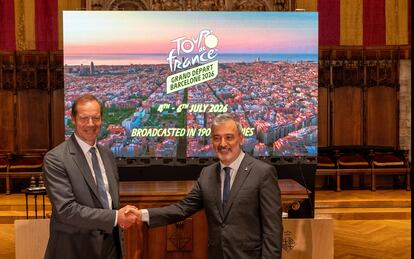Barcelona, Tarragona and Granollers: the three Catalan venues for the 2026 Tour de France


“Today marks the fulfillment of a dream that Barcelona has been pursuing for years,” said Barcelona Mayor Jaume Collboni on Tuesday at a presentation held in the historic building of the Llotja de Mar, under the motto Barcelona i el Tour, un bon tàndem (Barcelona and the Tour, a good tandem). He was referring to the 2026 Tour de France, as the Catalan capital has started the countdown to host the French round, the first three stages of which will be held on Catalan territory.
The first race will be on Saturday 4 July 2026 and will start from the beach, to crown the final stretch of the route with two successive climbs to the Montjuic Olympic Stadium . Along the way, the Sagrada Familia will make an appearance. A team time trial will shape the first kilometres (19.7) of the most important cycling competition in the world. A fact that has not happened since the 1971 edition.
These first 19.7 km will be added to the 178 km of the second stage, which will be run on July 5, with Tarragona as the main nerve centre. The race will pass through Sitges and a wide coastline until reaching another part of the most demanding section. After passing through Barcelona, the race will reach a final circuit dominated by a tough 1.6 km climb to Montjuïc Castle (600 metres at 13%) which will be crowned three times.
The 2026 Tour de France will bid farewell to Catalan fans on Monday 6 July in Granollers. The municipality will be responsible for hosting the opening of the third stage, over 100 km long, thanks to the popular La Porxada square . The last starting point for cyclists in Catalonia, before heading north to the French border. When you are a rider and you are presented with these routes, what you have to do is prepare yourself mentally. Different tactics will be seen and we will see who takes the yellow jersey in Montjuïc,” analysed Miguel Indurain about the route. For his part, Carlos Sastre commented that “leaving Tarragona on the flat and then with the three climbs to Montjuic will mean arriving with the race broken up.” “It will be exciting from the start,” he said.
“We have made it possible for Barcelona to be the only capital in the world to host the Olympic Games, the World Cup, the Copa America and now the start of the Tour,” said Collboni, aware of what it means to have made the “love story” between sport, France and Barcelona possible: “No other city has this agenda with cycling. It is a moment of pride,” said the mayor about the international value of the competition in the Catalan city.
Bringing the 113th edition of the 'Gran Dèpart' to Barcelona will cost the city 9,680,000 million euros , which will be broken down into three amounts, between the Generalitat de Catalunya, the Diputació and the Ajuntament de Barcelona: 3,025,000 euros will be allocated to the 2024 budget year, 3,630,000 euros for 2025 and 3,025,000 euros in 2026.
This will not be the first time that the competition starts outside France, as it has done so on 25 occasions. In fact, the last Tour held to date, in 2024, started in Florence, Italy. To this end, on the national level, San Sebastian was already the starting point in 1992, as will Bilbao in 2023.
After hosting the start of the Vuelta a España last year, the Catalan capital will host the riders of the 'Grande Boucle' in 2026 for the fourth time in its history. It already did so more than a decade ago, in 2009. Also in 1957 and 1965. But the most special one will be in two years, when Barcelona becomes - for the first time - the starting point of the most important cycling competition in the world, the Tour de France.
EL PAÍS






